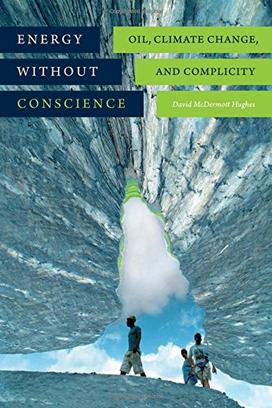David McDermott Hughes ’89 on Climate Change as a Moral Issue

The book: For many people, climate change has yet to become a moral issue. In Energy Without Conscience: Oil, Climate Change, and Complicity (Duke University Press), David McDermott Hughes ’89 argues that, the same way tobacco use often provokes revulsion, so should the use of hydrocarbons. Drawing on ethnographic work he conducted in the oil-rich Trinidad and Tobago, Hughes examines the way the production and consumption of oil, natural gas, coal, and bitumen occurs mostly unseen and unremarked upon, making it easy – but no less problematic – for hydrocarbon players big and small to be complicit in climate change.
The author: Hughes majored in politics at Princeton. Now an associate professor of anthropology and human ecology at Rutgers University, he is also the author of Whiteness in Zimbabwe: Race, Landscape, and the Problem of Belonging (Palgrave Macmillan) and From Enslavement to Environmentalism: Politics on a Southern African Frontier (University of Washington Press).
Opening lines: “How does it feel to change the climate? This question seems more absurd than impolite. It implies a chain of causation and responsibility that still remains invisible and mostly unacknowledged. In fact, some people — a billion high emitters — burn oil and otherwise pump carbon dioxide (CO2) into the atmosphere at a rate dangerous to societies and ecosystems everywhere. A slice of this population — overrepresented in the United States — disputes the science and scenarios of climate change. But explicit denial is less widespread than silence and disregard. The bulk of informed consumers simply don’t care a great deal about carbon emissions and their consequences.”
The reviews: Andrew S. Mathews, author of Instituting Nature: Authority, Expertise, and Power in Mexican Forests (MIT press), says, “Passionately arguing against the silence and unwillingness to think about the immorality of using oil, Hughes sets a high standard of engaged anthropology.”












1 Response
Jackson Davis
8 Years AgoFor a historical perspective...
For a historical perspective see: "A Political Theology of Climate Change," by Michael S. Northcott (Wm. B. Eerdmans Publishing, 2015), which traces the conflicting theological, philosophical, scientific, economic and political ideas about Earth and its climate, and concludes that ALL nations (to avoid cheating) have the moral responsibility to require that fossil fuels be kept in the ground to avoid disaster, although he doesn't have much hope of it happening.
https://www.eerdmans.com/Products/Default.aspx?bookid=7098